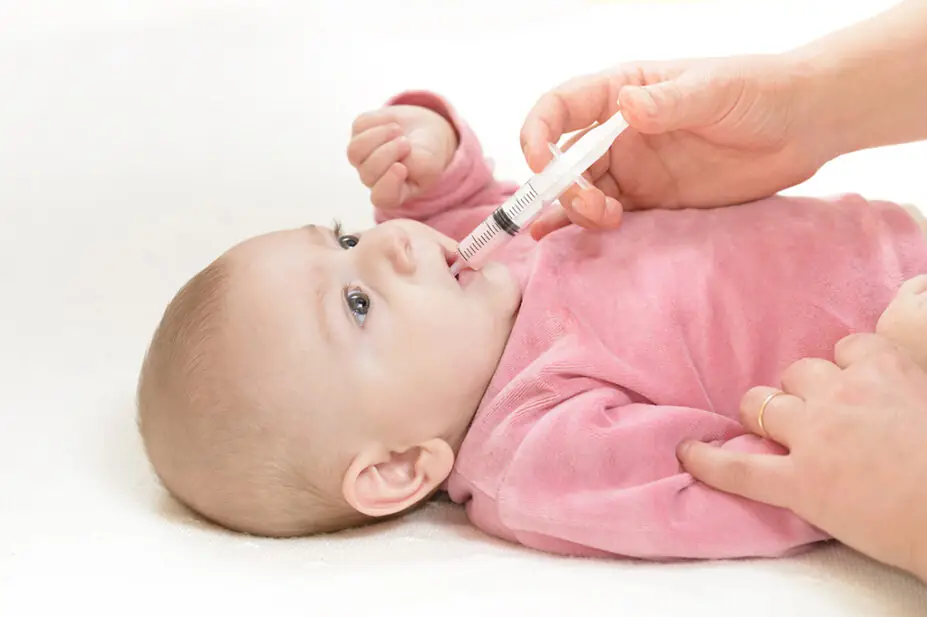
Shutterstock.com
Newborn babies needing antibiotics can safely complete their course orally at home, according to the findings of a pilot project in Devon.
The results of a six-month pilot, conducted at the Royal Devon and Exeter Hospital, demonstrated that switching eligible, clinically stable, term babies to oral antibiotics, such as co-amoxiclav, is safe and effective, which could have a positive impact on babies and families, free up resources and lower the environmental impact.
Traditionally, neonates suspected of developing infections before, during or shortly after birth have been required to stay in hospital for up to seven days on intravenous (IV) antibiotics.
Concerns about the efficacy of oral antibiotics in newborns have previously limited their use.
Holly Barker, lead clinical pharmacist in paediatrics, neonates and women’s health at the Royal Devon and Exeter Hospital, who was involved in the pilot, told The Pharmaceutical Journal that she was initially surprised when two consultants at the hospital approached her with research from Europe on switching newborns to oral antibiotics.
“We’re just so used to treating neonates in the way that we treat them… but being presented with these papers, it just seemed so obvious… we should get these babies home,” she said.
She assessed the clinical impact of the switch, including how well the drug would be absorbed, consulted with specialist colleagues and helped implement ‘to take out’ (TTO) packs on the ward so nurses could support families with administration and discharge.
In addition, families received printed information and phone check-ins from doctors during and after the seven-day course, while babies had to meet specific criteria, including term birth (≥37 weeks), clinical stability and ability to tolerate oral feeds.
Results from the pilot included:
- An average reduction of 2.7 hospital bed days per baby;
- Estimated annual cost savings of £66,500 for the trust;
- All babies completing their course of antibiotics;
- No increase in rates of re-presentation or readmission to hospital within the first 28 days of life;
- Reduced antibiotic exposure, with gentamicin doses decreasing from an average of 3.0 to 1.7 per baby;
- 94% of staff reporting positive impacts for babies, families and the wider hospital environment;
- An estimated 8,230kg of CO2 emissions avoided annually.
Both parents and staff involved in the pilot reported an understanding of their roles and confidence in managing the baby at home, according to the pilot’s findings.
Parents also reported feeling confident to administer medication and staff were comfortable having babies on the pathway.
The scheme was especially valuable in Devon, where one in four families live more than 20km from an acute hospital, while 60% of families live more than 50km from a neonatal intensive care unit (NICU).
Since the pilot, Royal Devon, Health Innovation South West, the National Institute for Health and Care Research (NIHR) Applied Research Collaborative South West Peninsula (PenARC) and the South West Neonatal Network have been working together to support wider adoption and evaluation of the approach across other trusts in the region.
Barker said she would advise other clinicians considering a similar project to “really utilise the resources that are already available to us, such as the Paddington medicines for children leaflets”, and that being part of the project was “a really nice opportunity” for the multidisciplinary team across the local neonatal unit.
“I’d encourage lots of pharmacists who work in district general hospitals to feel more empowered by this,” Barker added.
Sian Gaze, lead pharmacist in medicine and neonatology at Evelina Children’s Hospital in London, told The Pharmaceutical Journal that other centres across the UK were exploring similar pathways.
“I am very excited by the results of this pilot… pharmacists are champions of family integrated care, so any intervention that allows babies to remain close to their families and be discharged home sooner is to be celebrated,” she said.
“The use of oral antibiotics offers additional benefits, including reduced costs (less equipment and fewer tests), freeing up nursing time as families can administer treatment at home, and increasing cot capacity in hospital so staff can care for more patients.”
Abiodun Ogundana, lead antimicrobial pharmacist at Mid and South Essex NHS Foundation Trust, said the “fantastic” project “reduces the unnecessary prolongation of hospital stay, which is associated with other risks”, and aligned with national priorities, especially the UKHSA [UK Health Security Agency] intravenous-to-oral switch criteria for children (including newborns).
Dan Hawcutt, consultant paediatric clinical pharmacologist at Alder Hey Children’s Hospital, said the potential impact of early onset infections in newborns was “huge”, while IV antibiotics meant “lots of painful procedures for the babies, and massive impact on the family”.
“All paediatricians and neonatal staff will remember babies being cannulated and re-cannulated many times to make sure they get the full course.”
“This project carefully selected babies who were low risk — they had to be term (>37 weeks), clinically well and feeding, have negative blood and CSF [cerebrospinal fluid] cultures at 36 hours, and a falling CRP [C-reactive protein] (which was never greater than 50),” he added.
“The babies still get 36 hours IV antibiotics, while the cultures are awaited, but then it has shown that conversion to oral antibiotics is safe. This will affect practice nationally and internationally, and help both families, and busy neonatal units.”
On 6 August 2025, Stuart Logan, director at the NIHR PenARC, said the project was “a fantastic example of brilliant clinicians producing and using evidence which can improve the lives of newborn babies”.
You may also be interested in

Pharmacists provide antibiotics only where clinically appropriate, minor ailments scheme data show

Probiotics should be considered when prescribing antibiotics, finds systematic review
